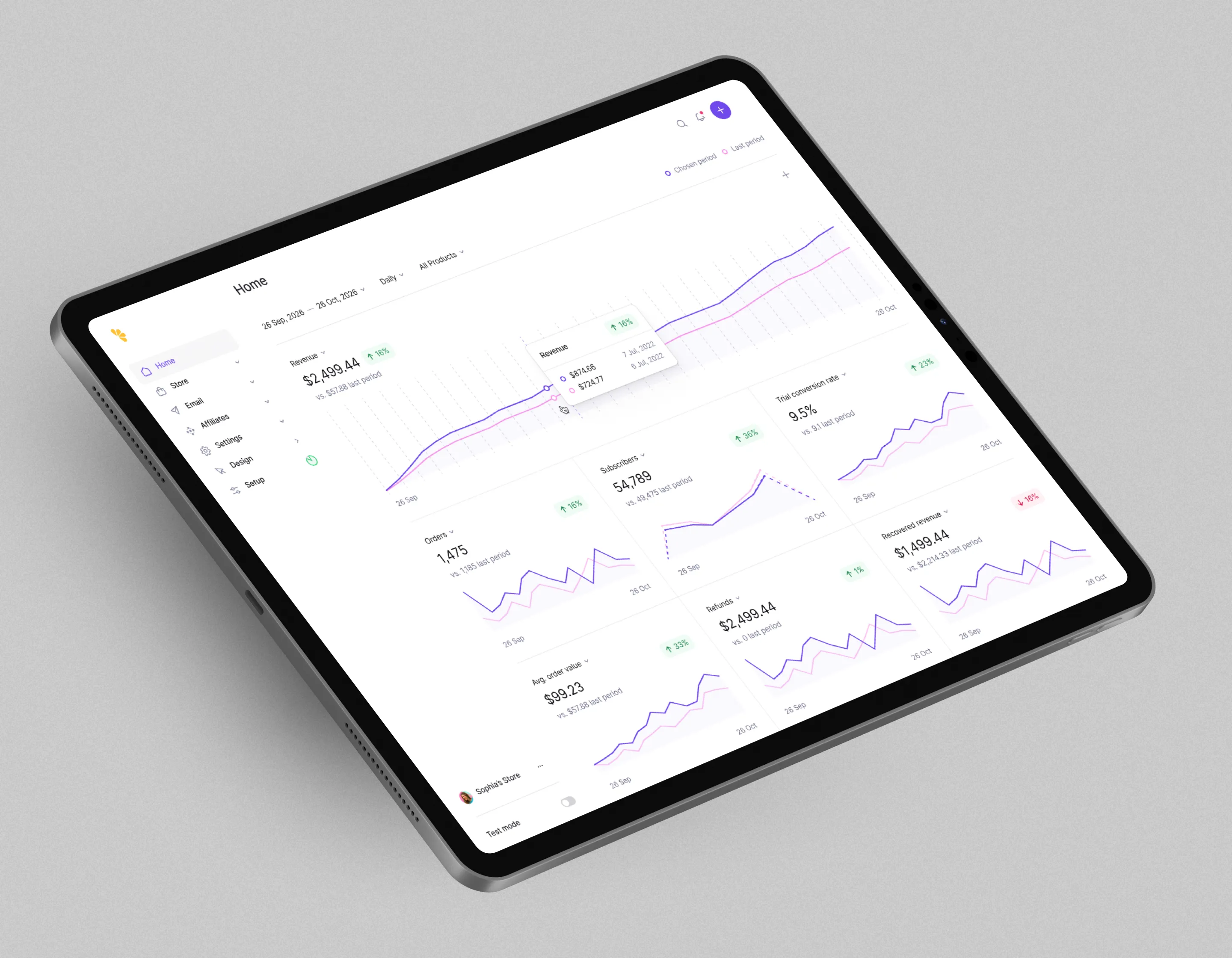
SaaS sales tax in the European Union: Doing VAT right
Author
Date
Category
As we continue to transition to an overwhelmingly digital-first world, the SaaS industry continues to grow and rise in popularity. SaaS products are designed to increase workplace efficiency for companies and individuals.
In 2022, the industry has reached a value of $171.9 billion and is expected to have a 17% growth rate. As the demand continues to rise, companies will need to take on the challenge of learning how to navigate Value-added Tax (VAT) in different countries. This is particularly true if you plan to expand your business into the European Union.
Most SaaS companies are looking to distribute their product worldwide as soon as possible, and rarely limit themselves to their domestic market.
Over 40 different countries have now implemented sales tax on digital goods and SaaS products. What’s important to keep in mind is that there isn’t a one size fits all solution. These sales taxes and the sales tax laws vary by country. It can be challenging for businesses to try to keep a pulse on all of the different rules. Not only that, but the consequences can be detrimental to your business if you run into liability issues.
If you aren’t sure where to start, don’t worry. We’re here to walk you through everything you need to know about how VAT works with digital products in the EU and how to manage compliance.
Let’s dive in:
Why a sales tax strategy is important for SaaS vendors selling in the EU
Sales tax in the EU isn’t like it is in the United States. While many countries may have similar rules and regulations that the United States follows, there are more standards you need to consider.
For starters, the vast array of countries can be challenging for your compliance team to keep track of on your own. If you don’t have a sales tax strategy, you risk running into tax-related issues with the law in these different countries.
Many companies that offer digital products choose to work with a merchant of record or build out a sales tax strategy to eliminate the hassle and to stay ahead of any legal issues.
Why do I have to pay VAT if it’s a digital product?
Under new legislation from the European Union, consumers are required to pay a value-added tax (VAT) on any digital product. Digital products and goods include website hosting, SaaS products, apps, music, and online gaming.
These rates vary based on the country the consumer lives in, not where the seller lives. That means businesses selling SaaS products or digital goods need to abide by these laws if they want to continue selling to individuals residing in the EU.
It doesn’t matter if your business is established in Europe or not. You’ll still need to follow the rules and regulations if you want to continue doing business there.
For example, let’s say you’re a company located in the United States selling digital goods or SaaS products to individuals living in the Netherlands. You’ll need to charge them the VAT rate for that country, which is 21%.
This is a relatively new concept for the SaaS industry overall. The only states in the United States that charge a sales tax on SaaS products are Tennessee and Vermont. However, familiarizing yourself with the sales tax laws and liabilities will help you stay ahead of the ongoing changes the industry is facing.
Before selling in the EU, you’ll need to register for VAT in the EU. However, with VAT MOSS, you don’t need to apply with each individual country in the EU. Instead, you can register for VAT in one single place and make all payments in the same place. This simplifies the process and makes it easy to grow your business in the EU.
If you have any questions or concerns about the process, we recommend reaching out to a tax professional to help you register before expanding your business to the EU.
Selling software internationally: what to know
If your SaaS company is choosing to scale globally, congrats! This is a huge accomplishment and isn’t as easy as it seems. However, if you’re choosing to sell software internationally, you’ll need to ensure all of your bases are covered: So you don’t run into any issues later down the line.
The biggest problem companies run into is compliance with sales tax. As the world around us continues to go digital, new regulations and rules around how to sell SaaS products and digital goods continue to grow.
The worst part is none of this is standardized. This means every country you sell in will be a completely different ball game and a new suite of issues with compliance.
You’re also at risk of payment failure. Even though you don’t need to worry about shipping your product across the border: International payments are regularly flagged as fraud by the bank. It’s something to be mindful of if you’re serious about expanding overseas.
Lastly, there are more than a few fees associated with international purchases. Almost all of your payments will have a transaction fee, which is normal, regardless of location. However, you’re also subject to paying cross-border fees, which can be around 1-2% of the total value of the transaction. If you plan on accepting different currencies, you can also be left with a hefty foreign exchange fee, which is around 1-3% of the total order value.
Even though all of this can be somewhat overwhelming, don’t let it discourage you! There are ways to combat these risks and liabilities that will give you the confidence to expand your reach into different countries in the EU.
B2B vs. B2C in the European Union
Almost all B2C transactions are taxable. The amount will vary depending on which countries within the EU you’re selling to. Keep in mind: The rules for taxing B2B and B2C vary by every country. In some places, B2B sales aren’t subject to VAT at all.
When trying to decipher the jurisdiction and fully understand the rules: It’s important to note that the definition of B2B and B2C also varies by country. In most of the EU, a B2B business is considered any business that is a VAT-registered business.
How to manage sales tax compliance
When it comes to running your own SaaS software company, it’s likely that you’re juggling several tasks at once and are required to wear different hats throughout the workweek. The last thing you want to do is add managing sales tax compliance to your growing to-do list.
Besides, it’s more challenging than you might think! If you want to expand to all of the EU without any limitations, you need to consider what the different standards are for over 40 different countries.
What is a Merchant of Record?
A merchant of record can be used as a reseller for your software. They are a separate entity authorized to process credit cards and debit card transactions on your behalf. This means they are also held liable if any problems with taxes arise. The merchant of record handles everything from processing payments to the fees associated with each individual transaction.
Using a merchant of record is a great way to streamline payment processing. Your business won’t need to worry about the liability aspect of any of your transactions in the EU. The trusted merchant of record, they handle all of the nitty-gritty details, including staying up to date on changes to laws involving sales taxes and transactions.
Checking where liability lies when using online tools
When you use online tools and work with a merchant of record, you don’t need to worry about International Tax Law, Sales Tax, or EU VAT. All of this is handled for you. The liability is transferred and no longer lies with your company.
This will give your SaaS company the peace of mind you need to continue to expand your business in new regions. A merchant of record provides a certain level of convenience and flexibility.
Using Lemon Squeezy or other tools as a merchant of record
Ready to grow your SaaS software company and take your business to new heights? You’ve come to the right place. At Lemon Squeezy: We want to help you confidently sell SaaS products in the European Union. Our team understands all of the ins and outs of sales tax EU, and we’re to help you every step of the way.
When you use us as your merchant of record, you can confidently sell your products knowing that we’re handling all the payment processing and the liability will land on us, not you.
Want to learn more? Contact us today.
Whatever stage of your journey, we’re here to help
No matter the stage of your company, we stand behind our promise to provide exceptional customer support, from initial setups to massive migrations and everything in between.
Invest in your business with peace of mind that we're here for you whether you need technical help or business advice.

Creator Guide
Looking for some advice on how to sell and market your digital products? Download the creator’s guide to dive deep into getting your idea off the ground.

Merchant of Record Guide
Free guide for all entrepreneurs and organizations explaining why partnering with a Merchant of Record is more important than you might realize.

Want merch?
Want some fresh Lemon Squeezy swag with all the lemon puns you could ever imagine? The wait is almost over as we’re gearing up for a limited-time merch drop.

Book a demo today and get your own personal guided tour of Lemon Squeezy
Still have questions about Lemon Squeezy? Book a call with our sales team today and we’ll show exactly how we can revolutionize the way your business handles global payments and sales tax forever.

Need help?
If you’re looking to get in touch with support, talk to the founders, or just say hello, we’re all ears.









